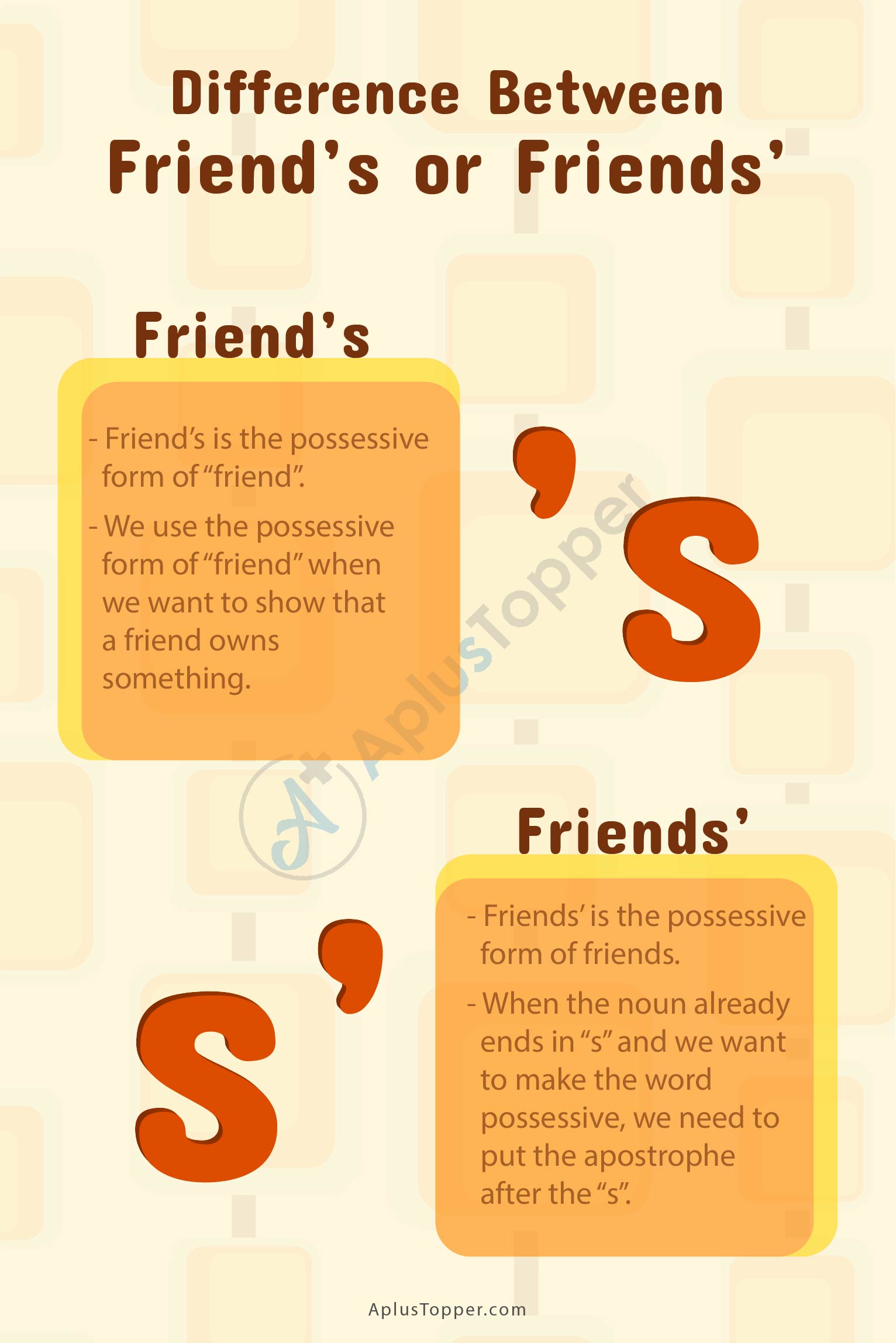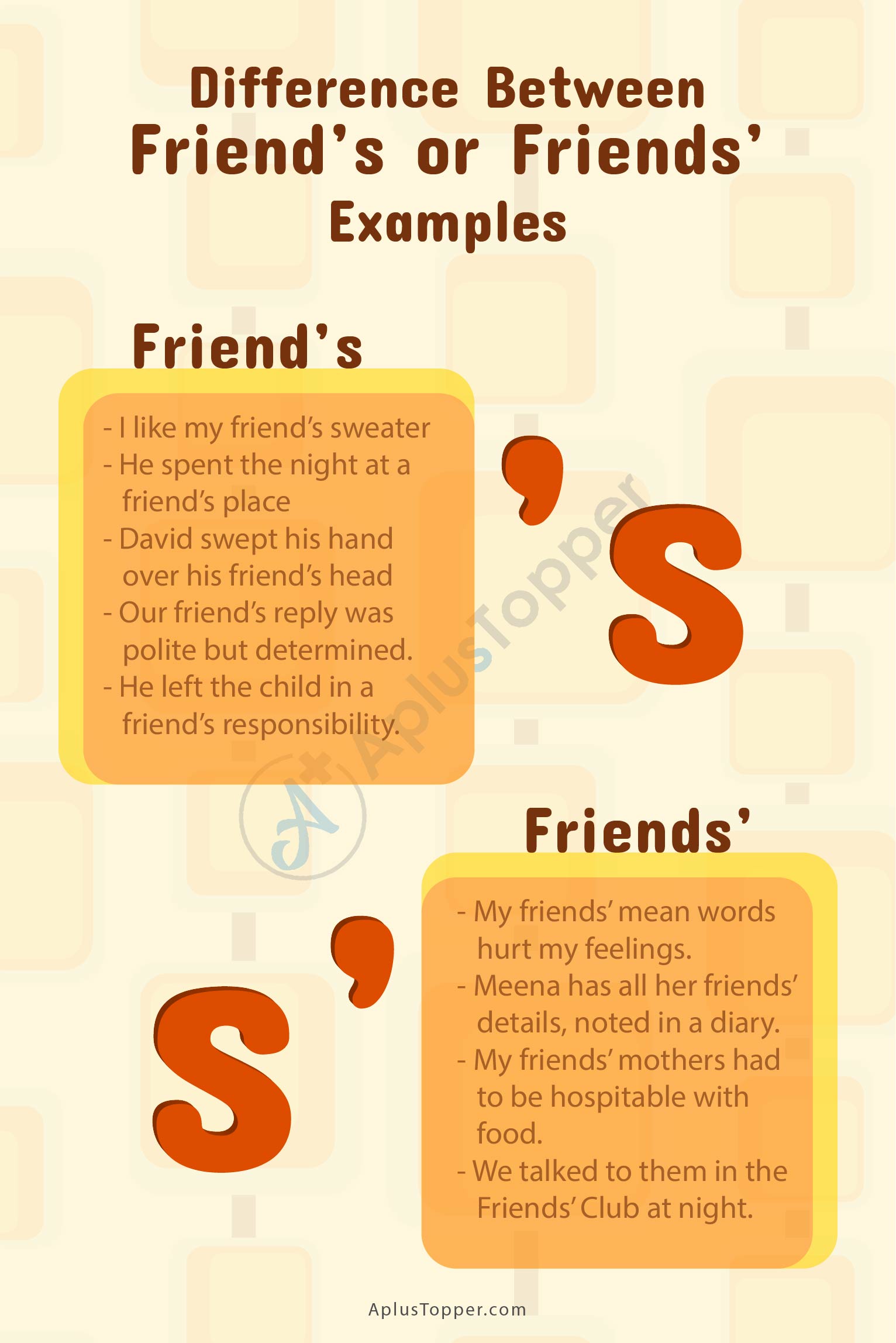Friend’s or Friends’: Friend’s or friends’, which is correct? Friend’s and friends’ both are correct. ‘Friends’ is the plural form of friend whereas ‘friend’s’ and ‘friends’’ are the possessive form of a friend. But the pronunciation of friends, friends’ and friend’s are almost similar.
Friend’s is used when something is said for one person but friends’ is used when two or more people are involved. Both closest friends and closest friend’s could be right contingent upon the unique circumstance.
- We use “closest friends” when you are portraying the relationship
- We are closest friends.
We really want to utilize the plural of a friend on the grounds that there are two individuals included. We use “closest friend’s” the point at which you are portraying things that your dearest friend owns(literally or allegorically).
At the point when we have the punctuation after the S, we’re discussing aggregate belonging that is claimed by more than one friend. So say, for instance, a few friends meet up to purchase something, you can discuss “my friends’ cash.” When you talk about friends with punctuation before the “s”, you’re discussing ownership of only one specific friend. At the point when you talk about “friends’ “with the punctuation after the S, you’re looking at something aggregately claimed by a gathering of friends. However, when you’re discussing one where you have punctuation before the S, you’re looking at something claimed by only one individual.
What is Friend’s?
A friend is a singular form. Friend’s is the possessive type of “friend”. We utilize the possessive type of “friend” when we need to show that a friend claims something.
- This is my friend’s home.
- We really want to care for our friend’s plant.
Recollect that we are discussing just a single friend. You can supplant friend’s with a name if that makes it more obvious.
What is Friends’?
Friends’ is the possessive type of friends. At the point when the thing as of now finishes in “s” and we need to make the word possessive, we really want to put the punctuation after the “s”.
This is our friends’ home. For this situation, large numbers of our friends live in the house and they own the house together.
In communicating in English, it very well may be hard to tell whether you are discussing one friend or numerous friends in the possessive sense friend’s and friends’ sound precisely something similar.

How to Use Friend’s and Friends’?
At the point when you have more than one friend, you call them “friends”. friends is a plural term.
At the point when you allude to a person or thing related to your friend, you use “friend’s”. Model, in case Tom is your friend and you allude to his cap, you can say my friend’s cap. Or then again you can say Tom’s cap.
There is another utilization of the ‘s. It is the point at which you need to pack the sentence. Assuming I need to abbreviate the sentence “Tom is leaving”, I can say “Tom’s leaving”. Thus, in case Tom is your friend, you can say “My friend’s leaving”. It doesn’t abbreviate the sentence excessively, clearly. Be that as it may, it is utilized in casual discussions, to not need to weigh on “is”.
Note that friend’s is utilized distinctly in a solitary sense, for example at the point when you are alluding to the relationship of a solitary individual. Assuming you need to allude to the relationship of more than one friend, you use friends’. Along these lines, if Tom, Dick and Harry are your three friends and you need to allude to their caps, you can say, Tom’s, Dick’s and Harry’s caps, or you can say my friends’ caps.
In the above model, if Tom, Dick and Harry have one normal cap, you say “everyone in the world cap”, however assuming you need to allude to the caps of every distinctive individual (as I did in the model above), you say “everyone in the world’s caps”.
There are many cases of disarray over some renowned days. It’s called Mother’s Day and Father’s Day, however, it is called Teachers’ Day. Generally in light of the fact that regularly, individuals don’t have more than one mother or father, however, they have more than one educator and they don’t need you to pick a most loved instructor, since you know, segregation. You could utilize Mothers’ Day for yourself in the event that you love your stepmom, and until we have something many refer to as Stepmother’s Day. Yet, you have just a single natural mother, so they may imply that. You get the significance. Simply go for whatever you might prefer. In any case, don’t utilize Childrens’ Day, since youngsters is now plural. There’s no Child’s Day since they need you to adore all youngsters similarly, in light of the fact that you know, they are kids. I know some of them are shrewd little rascals, yet they’re still youngsters and you should cherish them.
Examples of Friend’s
- I like my friend’s sweater
- He spent the night at a friend’s place
- David swept his hand over his friend’s head
- Our friend’s reply was polite but determined.
- He left the child in a friend’s responsibility.
- He placed a friendly hand on his friend’s shoulder.
- Mina’s been dating his best friend’s brother.
- He always seems at the house in her friend’s apartment.
- She joined his arm through his friend’s.

Examples of Friends’
- My friends’ mean words hurt my feelings.
- Meena has all her friends’ details, noted in a diary.
- Mostly the young smokers are influenced by the smoking habits of their friends’
- My friends’ mothers had to be hospitable with food.
- We talked to them in the Friends’ Club at night
- She was grateful for her friends’ support during her bad times
FAQ’s on Friend’s or Friends’
Question 1.
What is the meaning of friend?
Answer:
A person who is not related to you by blood but is your companion in school or college or at workplaces. A person who helps you and supports you and likes you is a friend.
Question 2.
Should friends have an apostrophe?
Answer:
If something is referred to a friend, then it is denoted by an apostrophe s. For, friend’s party, friend’s book, etc. When something belongs to two or more friends, then it is written as friends’.
Question 3.
What is the plural of a friend?
Answer:
Friends is a plural form of a friend.
Question 4.
Is friend singular or plural?
Answer:
Friend is a singular word that refers to one person.
